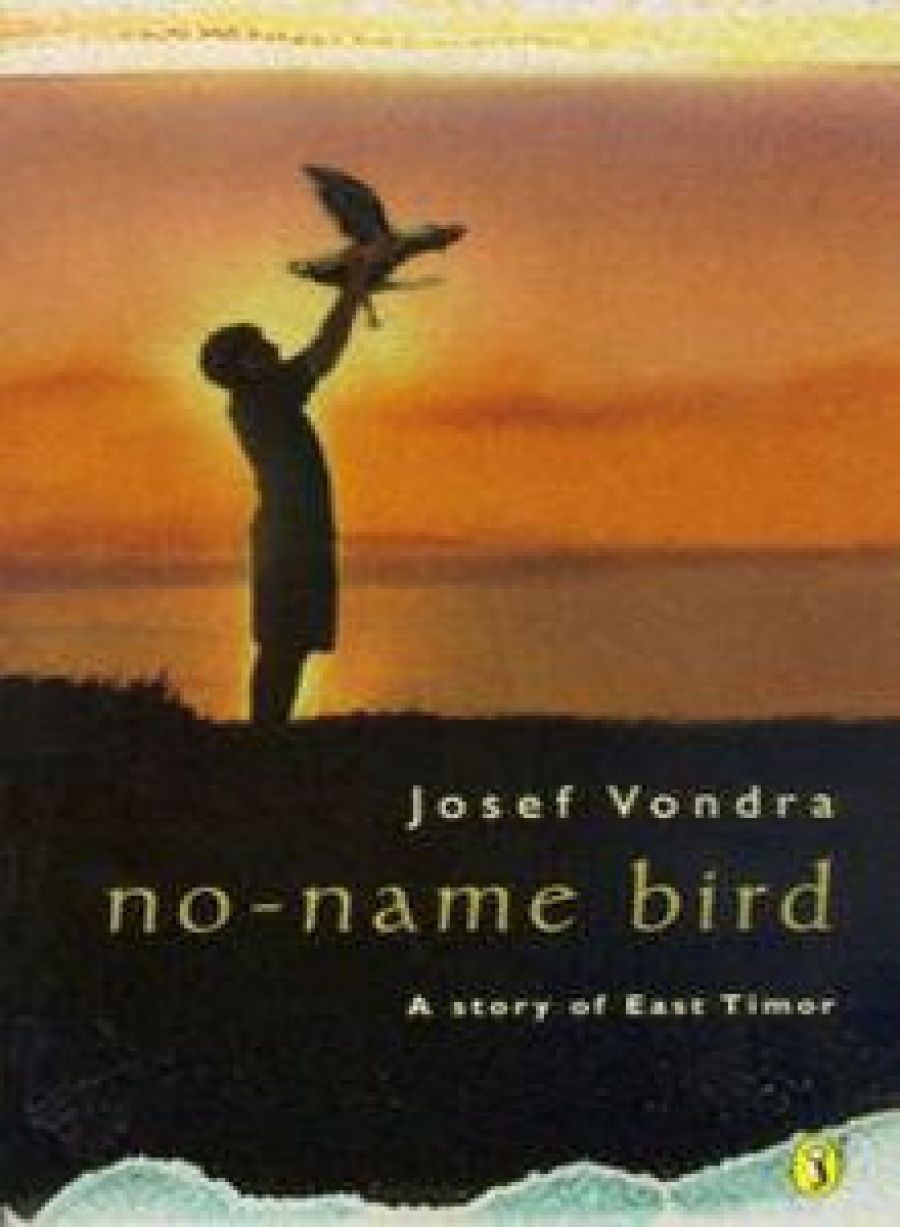
- Free Article: No
- Contents Category: Fiction
- Review Article: Yes
- Online Only: No
- Custom Highlight Text:
Given the recent happenings in East Timor, this is a timely novel. It is the moving story of the developing tragedy following the withdrawal of Portugal from its former colony and the invasion by Indonesia. The book is focused through Jose, a fourteen-year-old boy who finds the events puzzling and distressing. He finds some solace in the fighting cock given to him by his uncle, the person he most relies on for wisdom and guidance. Eventually, at the insistence of his mother, he is evacuated to Portugal, where he becomes a lawyer working for Amnesty International. The last chapter brings the book full circle, as we have first met Jose as an adult, in his law office in Lisbon, looking at a paperweight which holds the tail feather of a fighting cock.
- Book 1 Title: No-name Bird
- Book 1 Biblio: Puffin, $14.95 pb, 183 pp
No-name Bird is quite political with the author making a number of his characters voice strong opinions. The village priest tells Jose that the withdrawal of the Portuguese after four hundred years will lead to chaos. Politics, he says, ‘is like that. The fate of the people is of no consequence.’ A point is also made regarding the importance of Radio Australia in giving the people accurate information. Vondra’s own viewpoint on this is clear, as he himself is a former Radio Australia journalist and he has travelled extensively within East Timor.
While not being overtly didactic, the book will teach readers a great deal about events in Timor at the time. Interleaved with Jose’s story and indeed forming part of it, are descriptions of the struggle between the newly emergent political groups, the dislocation of families, and the reality of war – soldiers ‘fight and hurt each other’ – the breakdown of the infrastructure after the Portuguese leave. Established social customs also change, signifying the disintegration of the community. Jose’s mother has always done the cooking, even though she works long hours in the hospital, because cooking is a woman’s job. But when the hospital becomes overcrowded with wounded fighters from the brief but bloody civil war, she is at first too tired to cook and then, as the pressure grows even more, she frequently does not even come home. Jose’s uncle Adolfo takes over the cooking.
The book also acknowledges the help that the Timorese gave to Australian soldiers in World War II. The son of one of them comes to visit Adolfo to thank him for the support given to the man’s father during the war, help which is now in a sense repaid as the Australian helps to evacuate Jose and allow him to lead a new life in Portugal.
Running through the book is the theme of courage. Courage does not belong only to the strong and powerful. Jose is frequently bullied by the son of the richest man in the village. Carmillo is large and fat, Jose is small and wiry; and yet, for all his bluster and bravado, Carmillo is not among the brave when fighting breaks out. Jose, on the other hand, stands up to soldiers who invade their house, soldiers who try to get Jose’s father to admit he was a member of Fretilin. The fighting cock which Jose and his uncle buy is also small and wiry and seems no match for the much larger bird which Carmillo’s father pits against it. But it too has exceptional courage. The cock fights are one of a number of ongoing metaphors in the book. Small birds, says Uncle Adolfo, have more fighting spirit because they are small. Adolfo will not trim the bird’s comb, because it will rob it of pride and ‘without pride, a fighter has no courage’. Miguel, Jose’s stepfather, out of work, drinking too much and despised by his hard-working wife, is robbed of pride and is no match for the youths who attack him.
Adolfo works cleaning the swimming pool at the hotel. Gradually, as the troubles get worse and tourism falls off, he allows the pool to get dirty, to the point where it is covered in scum and smells – a metaphor for the disintegration of the society at large.
The publicity material about No-name Bird describes it as ‘an easyto-digest account of events leading up to the Indonesian takeover’ of East Timor. It is that but it also elucidates the complexity of the situation at the time. In addition, it gives a human face to the conflict and, by using a young teenager as the protagonist, it allows readers to place themselves in his position and imagine themselves living through a puzzling and frightening episode, an episode which leads to an equally difficult dislocation from family and country.


Comments powered by CComment